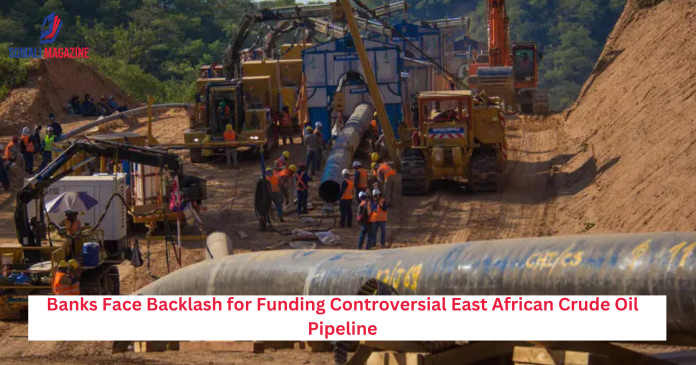Facebook Twitter (X) Instagram Somali Magazine - People's Magazine
Activists condemn financial institutions backing EACOP, citing environmental harm, human rights violations, and global opposition
The StopEACOP Coalition has strongly criticized financial institutions that have chosen to support the East African Crude Oil Pipeline (EACOP). According to EACOP Ltd., five banks have committed to funding the project. However, the company has not disclosed the loan amount, highlighting its ongoing struggles to secure full financing even after more than seven years.
Some of these banks had previously expressed interest in financing EACOP but faced heavy criticism from Ugandan and Tanzanian civil society. The African Export-Import Bank (Afreximbank), Standard Bank of South Africa, Stanbic Bank Uganda, KCB Bank Uganda, and the Islamic Corporation for the Development of the Private Sector (ICD) have now confirmed their involvement. This decision makes them complicit in environmental destruction and the exploitation of Uganda and Tanzania’s resources for the benefit of international corporations at the expense of local communities.
The world is already suffering from the effects of climate change, including droughts, floods, and extreme weather. Funding a massive fossil fuel project like EACOP is not only irresponsible but also harmful to the planet. Despite promises of economic benefits, the reality is that tens of thousands of people have been displaced to make way for the pipeline, receiving inadequate compensation and facing worsening living conditions. The extracted oil is primarily intended for export, enriching companies like TotalEnergies while local communities bear the social and environmental costs.
The opposition to EACOP has been growing. So far, 43 banks and 29 insurance companies have refused to support it. Even some of TotalEnergies’ major investors, like Nordea, are distancing themselves from the project, stopping new investments and considering further measures against the company.
The banks currently involved in partial financing are relatively small and unable to fund the entire project. Their involvement does not provide the credibility that EACOP seeks. The global financial sector must recognize EACOP for what it is: an environmental and human rights disaster.
Communities in Uganda, Tanzania, and beyond continue to fight against the project. The StopEACOP Coalition urges remaining financiers to publicly withdraw their support, ensuring that local communities are protected and the planet’s sustainability is prioritized.

